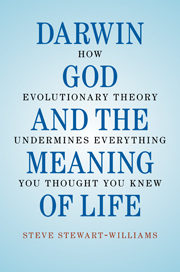 Darwin, God and the Meaning of Life
Darwin, God and the Meaning of Life Book contents
- Frontmatter
- Contents
- Acknowledgments
- 1 Darwin and the big questions
- Part I Darwin gets religion
- Part II Life after Darwin
- Part III Morality stripped of superstition
- 11 Evolving good
- 12 Remaking morality
- 13 Uprooting the doctrine of human dignity
- 14 Evolution and the death of right and wrong
- Suggestions for further reading
- References
- Index
13 - Uprooting the doctrine of human dignity
Published online by Cambridge University Press: 05 June 2012
- Frontmatter
- Contents
- Acknowledgments
- 1 Darwin and the big questions
- Part I Darwin gets religion
- Part II Life after Darwin
- Part III Morality stripped of superstition
- 11 Evolving good
- 12 Remaking morality
- 13 Uprooting the doctrine of human dignity
- 14 Evolution and the death of right and wrong
- Suggestions for further reading
- References
- Index
Summary
Animals – whom we have made our slaves we do not like to consider our equals. – Do not slave holders wish to make the black man other kind?
Charles Darwin, cited in Barrett et al. (1987), p. 228Few people seem to perceive fully as yet that the most far-reaching consequence of the establishment of the common origin of all species is ethical; that it logically involves a readjustment of altruistic morals, by enlarging, as a necessity of rightness, the application of what has been called ‘The Golden Rule’ from the area of mere mankind to that of the whole animal kingdom. Possibly Darwin himself did not quite perceive it.
While man was deemed to be a creation apart from all other creations, a secondary or tertiary morality was considered good enough to practise towards the ‘inferior’ races; but no person who reasons nowadays can escape the trying conclusion that this is not maintainable.
Thomas Hardy, 1910, cited in Millgate (2001), p. 311All the arguments to prove man's superiority cannot shatter this hard fact: In suffering the animals are our equals.
Peter Singer (2002b)Putting morality on a new foundation
A lot of the resistance to Darwin's theory of evolution by natural selection is based on the idea that it undermines traditional morality and that this is a bad thing. Among those who accept the theory, there are several responses to this.
- Type
- Chapter
- Information
- Darwin, God and the Meaning of LifeHow Evolutionary Theory Undermines Everything You Thought You Knew, pp. 258 - 279Publisher: Cambridge University PressPrint publication year: 2010


